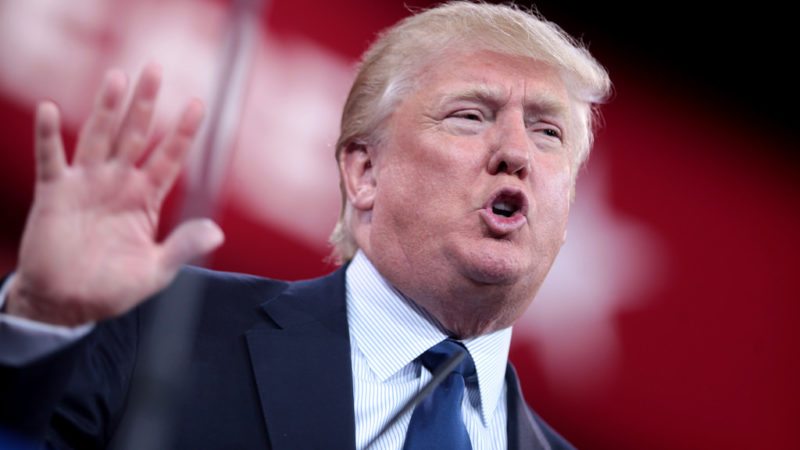Crashing out would leave us entirely at the mercy of countries like the US when it comes to trade deals.

On first glance, Donald Trump’s visit next week and the prospect of ‘no deal’ seem unrelated. But much like the fact the PM caved into granting this visit in the first place, no deal would represent a weakness in our global influence, rather than our power.
In February, the US government released its negotiating objectives for a future US-UK (yes, USUK) trade deal. While a trade deal is a long way off – they take years to negotiate – it fired the starting gun on what could become a very contentious debate.
And there’s a big problem on the horizon. Crashing out with no deal would leave us entirely at the mercy of the US and other states to deregulate labour, environmental and social standards to secure trade deals.
While our current relationship with the EU is based on common standards around workers’ rights and environmental protections (from maximum working hours to pollution limits), a Trump-led US will have no time for such trifling concerns.
“The only card we have is if we enter a deal with the EU [on these matters]…That would give the UK a stronger negotiating position. Crashing out means we could have to give up anything the US wants in a deal. Yet at the moment the [Conservative] leadership contenders are implying that we wouldn’t have to give anything up.” says Dr Michael Plouffe, an expert in trade policy at University College London.
Of course, if you’re an ideological right-winger, lowering social and environmental standards would be exactly the sort of policy you’d want.
“Most of the Conservative leadership seem to be thinking in a similar vein as what we saw in the US prior to Trump – [believing that] deregulation and relying on markets to provide a solution to everything, which only happens when you have perfect competition.
“It’s the sort of response you get from first year economics students about how markets work…before they’ve taken their other modules and learnt about the flaws,” Dr Plouffe tells LFF.
He points to a potentially-telling feature of the US’ negotiating position when it comes to the UK. The wording of the US objectives focus explicitly on the UK’s obligations when it comes to these standards.
In contrast, US objectives for negotiations with Japan refer to both “parties”, rather than specifically Japanese obligations. It’s one symbolic sign of how weak a post-Brexit Britain is perceived.
Where might we see standards dropped? It’s no secret that US healthcare networks are keen to move in and compete with the NHS. “You may end up seeing deregulation and American based competition whittling away at what the NHS can provide.” Bizarrely, we could also see this in rail network, despite the US rail system being famously appalling. The US may also seek to ‘harmonise’ (i.e. bring down the UK’s) environmental rules.
For now, there’s no firm timeline on a US-UK trade deal: there’s far too much uncertainty with Brexit, and the small question of who is going to run the government. Meanwhile, the US is facing some early ‘headwinds’ ahead of the 2020 elections.
One thing is clear – a UK faced with the ‘shock and awe’ destruction of high tariffs following a no deal Brexit would be desperate for a quick trade deal with the US. And American companies will be licking their lips.
Josiah Mortimer is Editor of Left Foot Forward. Follow him on Twitter.
Left Foot Forward doesn't have the backing of big business or billionaires. We rely on the kind and generous support of ordinary people like you.
You can support hard-hitting journalism that holds the right to account, provides a forum for debate among progressives, and covers the stories the rest of the media ignore. Donate today.




7 Responses to “There’s another reason why no deal would be a disaster – and no one’s talking about it”
Mike Smith
It’s a Tory Brexit. This is just as disastrous as every other Tory privatisation and policy we’ve had inflicted on us since 1979. There won’t be an election until 2022 if the Tories succeed in getting no deal or a deal. We won’t have ANY socialist policies to implement because the Tories will have signed 10-15 year contracts for the Americans to ” run ” our already heavily privatised NHS. Read ex American health CEO and executive Simon Stevens Long Term Plan for the health service. ( It’s no longer National. ) the funding is reduced to 3.1% well below the 4.2 % universally agreed is necessary to just stand still and even further below the 6% required to address the shortage of 110,000 staff.
In fact there’s nothing in the Plan about addressing staff shortages. If you want to see what Americanisation looks like then check Kaiser Permanente. That’s what a growing number of areas are already implementing. Physicians assistants instead of GP’s. Pharmacists instead of GP’s. Algorithms to send you off to a max 6 visits to a physiotherapist or mindfulness.
A Labour Party Brexit has the possibility of restoring at least some socialism. The Tories will ensure that under a Tory Brexit there won’t be a hope in hell. Try bringing the buses back under local ownership and control.
Janet Marks
Dave Roberts – I think you’ll find that the new Labour MP for Peterborough was signalling her disapproval of the current Israeli govt regarding Palestinians – not Jewish people en masse.